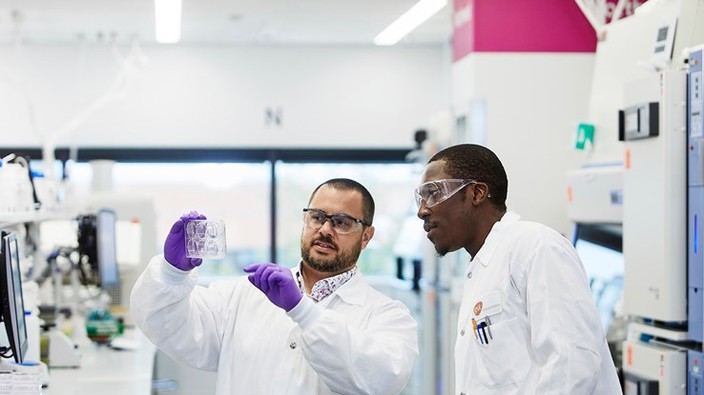transforming scientific curiosity into progress in gynaecologic cancers
how gsk researchers are attempting to optimize treatment options for cancer patients

every scientific advancement starts with a question. it is our curiosity, our drive to ask complicated and catalysing questions that propel us toward answers which address the needs of the patients we serve. at gsk, our work is inspired by an overarching curiosity to contribute to this progress, sparked by individuals’ professional and personal experiences. as global head of breast and gynecological oncology, global medical affairs, i’m an active witness of our teams’ passion for science.
together we embrace new ideas, take smart risks and work closer with our academic partners to bring disruptive change, quicker, for the patients we serve.
when i began my career in the pharmaceutical industry over a decade ago, prospects for people living with gynaecologic cancers were bleak. since then, robust research has led to a dramatic increase in the number of new treatment options that have brought hope for people living with cancer.
as research and development evolve year after year, having a direct impact on present and future patients, we must acknowledge the advancements we’ve made as a scientific community in the gynaecologic oncology space. however, important work remains to uncover treatment approaches that offer improved outcomes and quality of life for patients.
advertisement
at gsk, our team is focusing on the next set of key questions to develop and optimise treatment options for patients in areas such as immuno-oncology (i-o), synthetic lethality and diagnostics.
immuno-oncology: new discoveries in the field of immuno-oncology (i-o) have enabled more precise and effective targeting of tumours. however, to bring the benefits of i-o to more patients, we must continue to build and improve upon existing options. pursuing this research can help us identify optimal targets for specific cancers, inform on the most effective approaches to apply them and achieve improvements in efficacy while reducing side effects. research on existing i-o treatment options can additionally help better inform treatment decisions for specific patients, and i’m particularly excited about what we’re doing at gsk in this space.
synthetic lethality: in parallel with immunotherapies, the research community has identified another exciting strategy for developing anticancer therapies – synthetic lethality. in 2014, with poly (adp-ribose) polymerase (parp) inhibitors became the first oncology therapy that relied on synthetic lethality for the treatment of ovarian cancer. this targeted therapy enabled the research community to better focus our treatment approach on the specific gene mutations behind the cancer.
advertisement
diagnostics: diagnostic advancements, such as identification of new molecular biomarkers and the development of related tests, are enabling us to identify the patients most likely to respond to treatment and target treatment to those most likely to benefit. these advances are particularly significant because most people with a gynaecologic cancer already have advanced disease at the time of diagnosis. that said, despite the evolution in the diagnostics landscape, many patients are not receiving the tests they need to diagnose and treat their cancer early in the patient journey. biomarkers are important prognostic tools that can inform likely patient outcomes and highly valued clinical markers supporting therapeutic decision-making.
many of us in the gynaecologic cancer community are driven by a common goal – to improve outcomes for people living with these cancers. i am inspired by our collective efforts to discover and deliver new approaches that will help improve quality of life for patients, and proud that gsk seizes opportunities to collaborate, learn and share.
together, we can continue to answer the key questions that will further revolutionise outcomes for patients living with gynaecological cancers.
advertisement
this story was provided by gsk for commercial purposes.
 3 minute read
3 minute read






